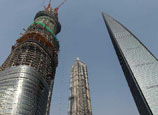
The lack of artistic pizzazz notwithstanding, Feng's movie does carry ample ideological significance. First of all, "Back to 1942" addresses a special period in modern Chinese history but manages to exclude the presence of the ruling party, a practice rather unfamiliar in the Chinese custom of moviemaking. Unlike previous movies set in the same time frame, Feng's new product does not blame the tragedy solely on Kuomintang, portraying its party chief as a helpless ruler barely able to command his subordinates due to a complication in domestic and international issues.
In essence, "Back to 1942" is both an accusation and a wish. The accusation is on the Kuomintang government as well as on the Chinese people in general who failed to alleviate the disaster. But to some extent, it is also a warning for the current ruling party to prevent similar circumstances from happening again, circumstances that force humans to abandon all compassion.
The film features 19 major characters from humble refugees to foreign journalist and government leaders, some of which are not absolutely necessary. Nonetheless this sizeable lineup paints an effective panorama of a disaster-stricken China and provokes ideas and emotions from the audience.
On my scale from one to ten, "Back to 1942" gets a seven.















 Cumquat market in S China's Guangxi
Cumquat market in S China's Guangxi


![]()
